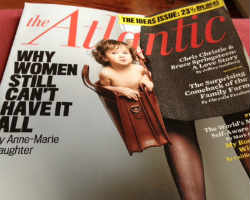
I’ve been hearing a lot of hubbub about Anne-Marie Slaughter’s Atlantic Magazine (July/August 2012) article called “Why Women Still Can’t Have It All.” It’s had over a million views online in less than a week. I caught her appearance on the PBS Newshour on June 26, 2012 and also read Carolyn Anderson’s opinion, “Why Women Still Can’t Have It All (at the Same Time)” in the June 26, 2012 issue of the Huffington Post.
I applaud both concepts: women can’t have it all, all the time, but can have it all in a time-phased sort of fashion. That has been my experience.
Slaugther’s basic premise is women cannot be the best in their careers if they also want to be the best mothers for their families. It is not possible. And even though she was an early advocate of the thesis that women could have it all, all the time, and even created a smokescreen that she was doing her best at both, her son suffered as a result of her being an absent and too-busy mom.
So she decided to quit her high-power job in the State Department and go back to being a college professor with flexible hours that allow her more time as a mother. Thus this article. She decided to expose the truth about her experience as a woman and mother working in a high-power job.
I never had the high-power job in the first place. I opted not to pursue it. In the early 1960s, I hired into an aerospace company one year out college to work in a writing and editing group that helped produce technical reports and proposals. But like most women in those days, I was classified non-exempt, working beside a group of lazy men. The women did all the work. The men got the money and the recognition. Three years later I was a part of a class action suit, winning exempt status, but not equal pay for women. Instead we got a $10 a week token bump to make up for no more overtime pay.
In the next five years I got married and started a family, and early on I decided my family came before my career. My company gave me the flexibility to work part time after my first son was born. Then later on I said no (without batting an eye) to a management position offered when I was pregnant with my second child. That was a big deal because believe me, in the 1970s women in management at my company were almost unheard of.
Shortly after my second son was born, I decided I had to leave the job entirely. My part-time hours were too inflexible, and I was uncomfortable about having a nanny raise my children. That didn’t mean I quit working. During the ten years I was away from the company I sold real estate, wrote grant proposals, and raised money for non-profits. These were jobs I could do in between the demands of my family and during the weekends when my husband took care of the boys.
I got off the corporate ladder by choice and never looked back.
Although I did go back to work on proposals with increasingly higher-level positions at the same company, I never was a manager. I’m glad. While on the job in the last few years I saw many women managers struggle to juggle their careers with carpooling, staying home with a sick child, attending a game or school meeting, and preparing family dinners. They were frazzled, late to meetings, and unfocused. I can’t tell you how many times I heard my women colleagues say they needed a wife.
Instead I trained engineers how to write in English, I developed proposal processes and best practices, and I facilitated writers, editors, and artists as we produced one proposal after another. One of my favorite jobs was mentoring the young women who came to work in our department. All of that gave me a sense of accomplishment and self-worth. In fact I was awarded a Women of Achievement award just shortly before I retired.
However, it was when I finally retired that I began to have it all. I didn’t have any children at home to care for, I didn’t have a day job, and I had all the time in the world to pursue the writing career I always wanted to have. I had a book published, I have become a web journalist, I write poetry, I’m writing a novel, and I volunteer to further the causes so important to me. I certainly am an example that women can have it all, but not at the same time.
Editor's Note: We would love your feedback on this article. Women: have you found difficulty juggling career and family? What sacrifices, if any, have you needed to make in order to balance your life?
Madeline Sharples' stories and articles have appeared online and in print. She recently published her memoir, Leaving The Hall Light On: A Mother’s Memoir of Living With Her Son’s Bipolar and Surviving His Suicide (Lucky Press LLC 2011). She co-authored Blue-Collar Women: Trailblazing Women Take on Men-Only Jobs (New Horizon Press, 1994) a book about women in non- traditional professions and co-edited the poetry anthology, The Great American Poetry Show, Volumes 1 (Muse Media, 2004) and 2 (2010). Her poetry accompanies the work of photographer Paul Blieden in The Emerging Goddess and Intimacy and appears in several print and online publications.
To read more of Madeline’s writing, click here, or visit her blog at www.madeline40.blogspot.com or www.madelinesharples.com.




